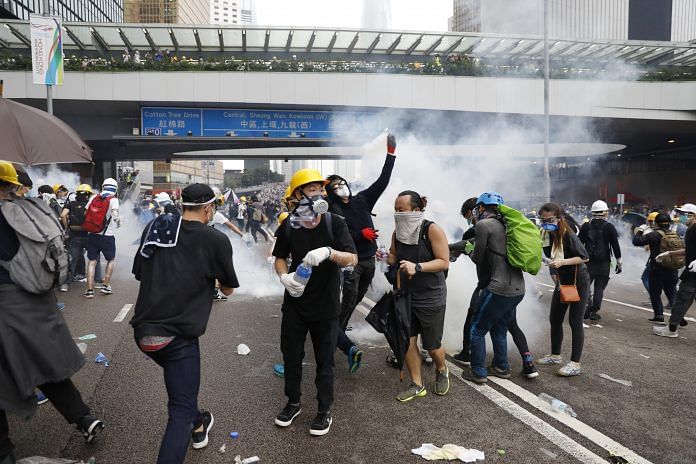If approved, proposed bill will allow extradition requests from mainland China to Hong Kong, Macau and Taiwan
Following Sunday’s demonstrations, Hong Kong saw yet another round of mass protests against the proposed ‘extradition bill’. People blocked key streets around central Hong Kong, which houses several government buildings.
When agitators tried to storm inside government buildings, police responded by firing rubber bullets and using tear gas at the crowd. The clashes left 72 people injured, including two women who are reported to be in a critical condition.
Hong Kong’s citizens are protesting against a draft extradition bill with the mainland Chinese government. If approved, this bill will allow extradition requests from PRC to Hong Kong, Macau, and Taiwan.
Contentious bill
At the heart of these protests lies the proposed procedure for extradition of suspects. While courts in Hong Kong would decide the extradition requests on a case-by-case basis, the final call will be made by the region’s chief executive, who is the head of its government. The chief executive, on the other hand, is appointed by a Beijing-dominated election committee.
According to the Basic Law of the Hong Kong Special Administrative Region of the People’s Republic of China (which is constitution of Hong Kong), the chief executive is supposed to be “accountable” to Beijing. Critics of the bill, therefore, argue that the chief executive is unlikely to reject any demand made by Beijing.
At present, Hong Kong does not have an extradition treaty with the PRC.
One country, two systems
Hong Kong’s Basic Law, its mini constitution, which was ratified in 1997 adopted the “one country, two systems” concept which ensured that Hong Kong enjoyed a legal system different from the PRC.
Having freedom of assembly and right to free speech, Hong Kong has also become a symbol for civic freedoms. Dissidents of Beijing would often escape to Hong Kong and critique the government of mainland China.
Hong Kong also houses regional multinational headquarters and is an aviation hub. Critics argue that the proposed extradition law will allow the Hong Kong police to not only target dissidents but also pick up foreigners, if the Beijing government so desires.
Chinese ‘control’ over Hong Kong
While the Basic Law allows Hong Kong’s citizens a set of relative freedoms, critics contend that Bejing has tried to consistently water down Hong Kong’s autonomy over the past few years.
It started in 2014 when the police, on orders of the PRC government, tried to crush the pro-democracy “Umbrella Movement” protests in Hong Kong.
Some other instances involve legal rulings that have disqualified Hong Kong’s pro-democracy legislators.
Critics also believe that the extradition bill is another instance of Beijing trying to dismantle the “one country, two systems” concept, effectively bringing Hong Kong under the complete control of the mainland Chinese government.
Additional readings:
Hong Kong extradition protests leaves city in shock, BBC:
Why Hong Kong’s extradition bill has set off alarm bells, The Financial Times
Is it too late to save Hong Kong from Beijing’s authoritarian grasp? The Guardian



